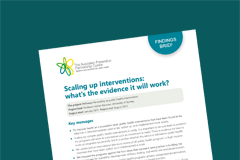Scaling up interventions: What’s the evidence it will work?
This project set out to provide the evidence that will help policy makers decide whether programs are scalable, that is, that they will work, be widely adopted, be acceptable, and be cost effective when rolled out at state or national level. Read the Findings Brief PDF to learn about the project's key findings and the relevance for policy.
Key messages
- To improve health at a population level, public health interventions that have been found to be effective in selected samples need to be ‘scaled up’ and implemented more widely.
- Scaling up complex public health interventions is costly. It is important to be sure there is evidence the programs will work at scale before such an investment is made. There is evidence for how to scale up programs successfully, but it is unclear whether this advice is followed in public health.
- We conducted an international literature review of 40 public health programs in high-income countries that have been scaled up or implemented at scale.
- We mapped the programs against the four steps that represent best practice in building the evidence base for scalability: development, efficacy testing, real-world trial and dissemination.
- There are varied trajectories in how public health programs achieve widespread dissemination, and these do not necessarily follow recommended evidence-based practice.
- Almost half (45%) of the programs we studied did not follow the four best practice steps. Some programs went directly from the development stage to population-wide dissemination, without efficacy testing or a real-world trial.
- Many programs internationally had been rolled out without having the evidence in place to indicate they would work at scale.
- Policy makers and practitioners should assess the evidence trail for interventions they are considering scaling up.
